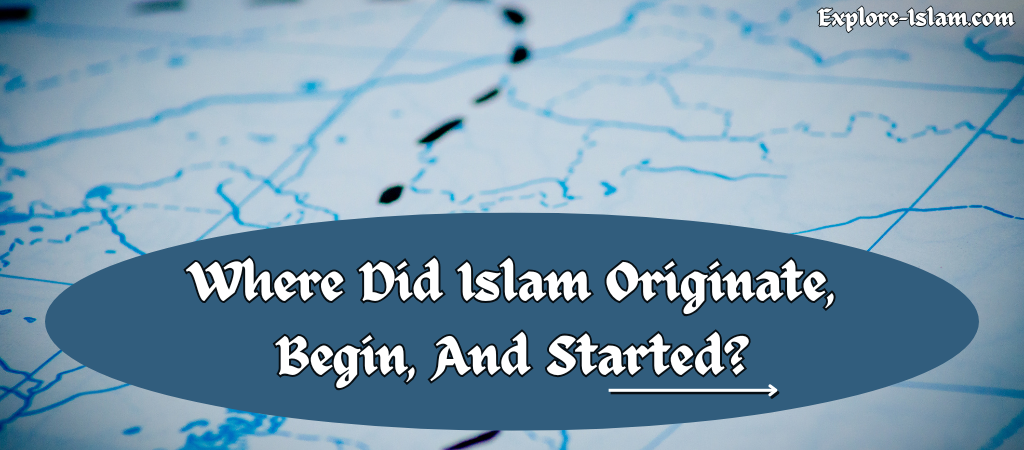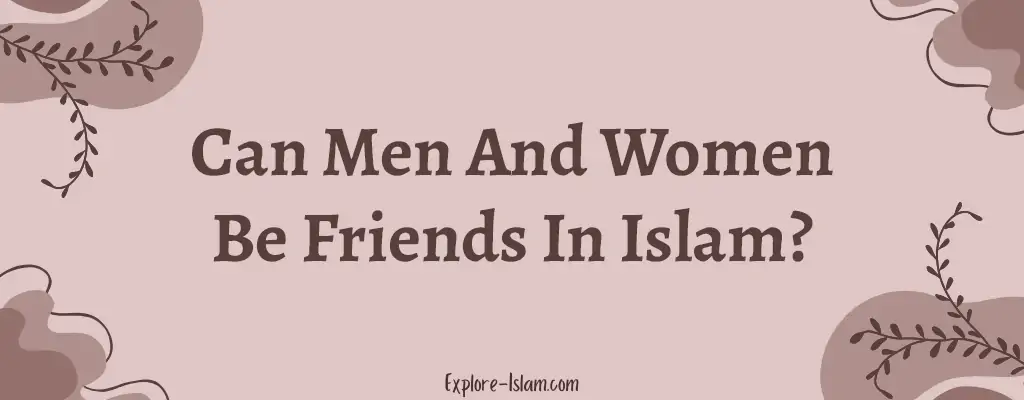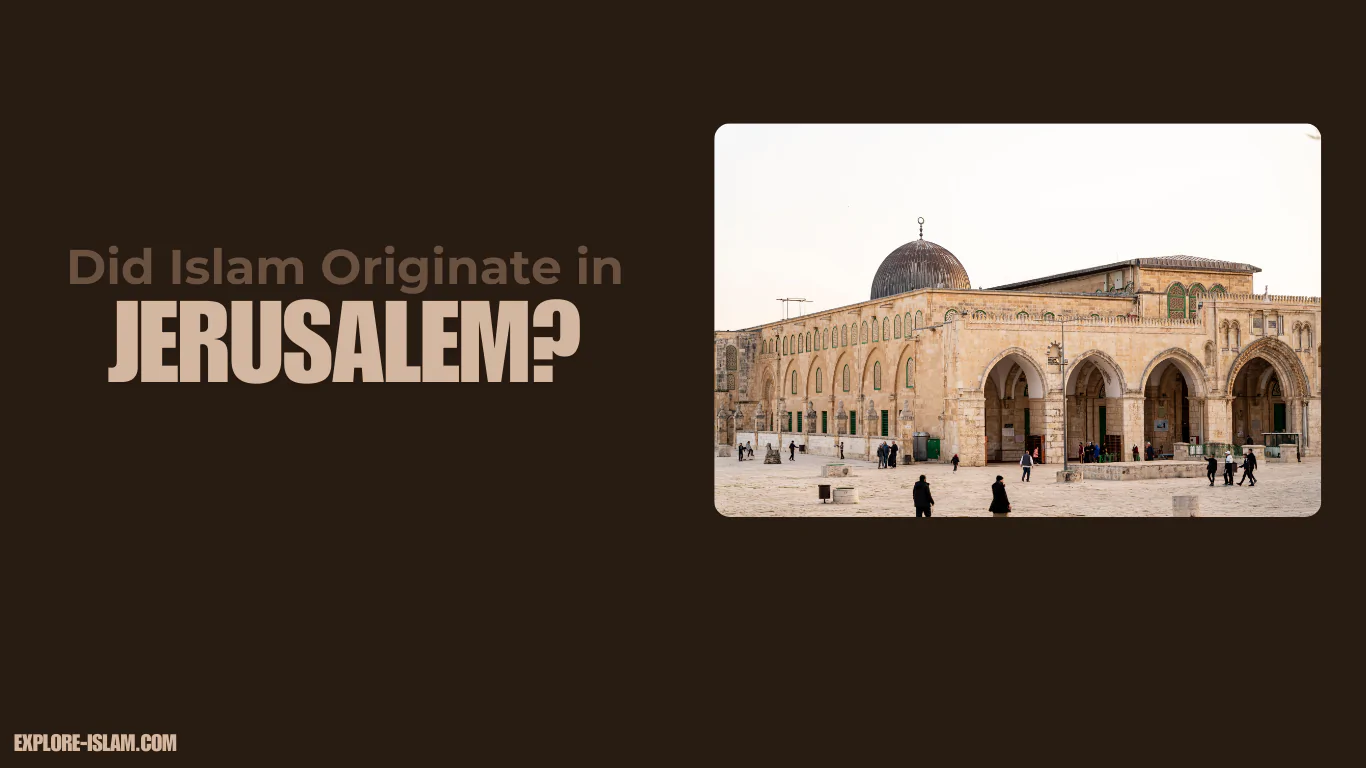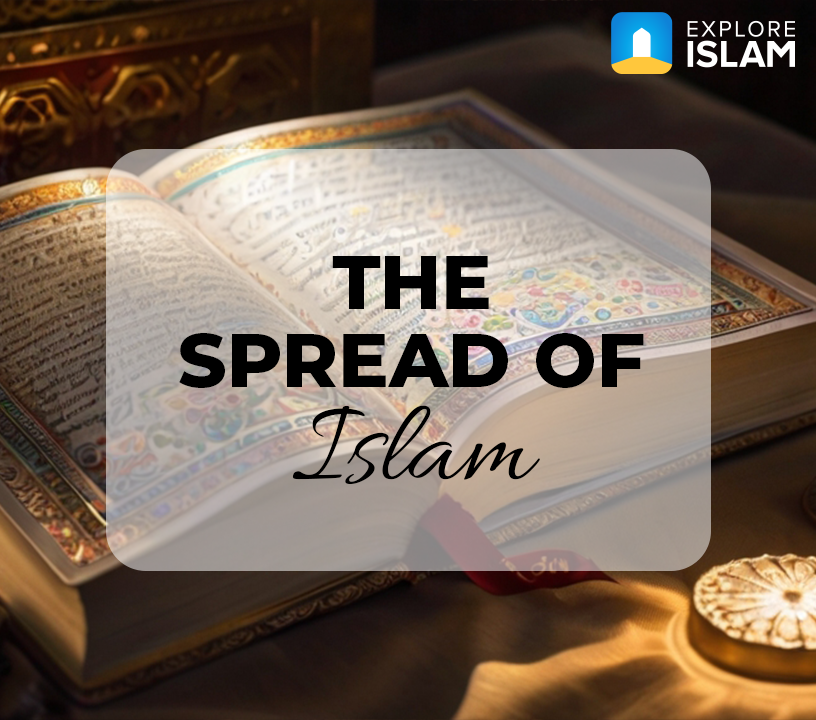Islam is undeniably the fastest-growing religion in the world since its inception, despite countless attempts to distort its image or claim it was spread by force, leading to the infamous question: Was Islam Spread by Sword? These baseless accusations have failed to overshadow the truth about Islam and its remarkable resilience.
The steadfastness of Islam, as a deeply rooted belief system, continues to overcome countless challenges, growing stronger and spreading farther with each passing day. This extraordinary growth has sparked curiosity about the religion’s essence, its enduring appeal, and the factors driving its expansion to every corner of the globe, uniting people regardless of race, gender, culture, social status, or education level.
In this article, we delve into the origins of Islam, the genuine reasons behind its widespread appeal, and address some key questions. Open your mind, read carefully, and discover the truth for yourself.
The Spread Of The Message Of Islam – A Message of Monotheism
At its heart, Islam, like all divine messages, calls for monotheism—the worship of Allah alone as the One and Only God. This central belief aligns with the timeless messages conveyed by all prophets since the creation of humanity, calling people to worship Allah and reject false gods.
The Quran reaffirms this core message, preserving the original teachings of previous prophets and scriptures and serving as a divine reminder for all of humanity. Islam’s essence is the submission to Allah’s guidance—a message that has been divinely preserved across ages and entrusted to humanity as the ultimate truth until Judgment Day.
By calling humanity back to this unaltered faith, Islam represents the continuation of divine truth, guiding people to seek Allah’s mercy and success in both this life and the hereafter.
Muslims Are The Guardians of The Divine Message:
Muslims are the guardians of delivering Allah’s Message to humanity; sword is to guard the call of Islam, and to guarantee safety for people from transgressors shushing the truthful voice of Islam; Allah Almighty says:
[You are the best community ever raised for humanity—you encourage good, forbid evil, and believe in Allah…] [Ali’-Imran: 110].
This sacred mission involves inviting humanity to the teachings of Islam through compassion, wisdom, and example. This guidance reflects the core of Islam’s message, emphasizing peace, integrity, and the preservation of divine truth.
Through peaceful means such as da’wah (invitation to Islam), exemplary conduct, and respect for human nature’s intrinsic inclination toward monotheism, Muslims aim to guide others without compulsion, using no swords for so, except when necessarily needed.
Was Islam Spread By The Sword?
Contrary to misconceptions, Islam was not spread by the sword as a means of forced conversion. Historically, it spread through the innate appeal of its teachings, the moral character of its followers, and the peaceful efforts of Muslim merchants, scholars, and leaders.
When military action was taken, it was strictly defensive, aimed at preserving the Muslim community against persecution and allowing people the freedom to explore faith without coercion. Even within the context of jihad, the Quran forbids forced conversion, as [there is no compulsion in religion] [Al-Baqarah: 256].
Thus, Islam’s true expansion relied primarily on its principles and the genuine curiosity of those who witnessed its followers’ piety and moral strength. This legacy, reaching from West Africa to Southeast Asia, shows that Islam’s growth is rooted in universal values and the innate human connection to the divine.
Did Muslims Use Force To Conquer Other Nations Forcing People To Convert To Islam?
Then came the conquest era which mainly started shortly before the passing away of Prophet Muhammad (peace be upon him). It started with the messages sent by Prophet Muhammad (peace be upon him) to the most prominent leaders of the world at his time to invite them to Islam, including the Byzantine Emperor Heraclius, the Persian Emperor Khosrow II, and the ruler of Egypt, among others.
Understanding the Need for Conquests
Now let’s see why early Muslims used force to conquer other nations. In Islamic literature, this is called “Islamic Conquests” [الفتوحات الإسلامية]. Why were these conquests a necessity at that time?
Imagine yourself as a scholar who just found out a new medicine that will cure the most vicious diseases of the modern time, including cancer for example. Now imagine that you are noble enough to disclose the formula of this brand-new magical medicine to all humanity for free. You just want what’s good for them.
However, the huge manufacturers of medicine in the world would not let you do this, simply because this will ruin their business overnight. Now the question is: Wouldn’t you “fight” those evil, self-centered manufacturers to deliver the message you have to the people who need it the most? That’s what the early generation of Companions did.
Read also: How Did Islam Spread from 750 to 1700?
The Prophet’s Peaceful Invitation To Deliver the Message of Islam
Prophet Muhammad (peace be upon him) peacefully approached the kings and rulers of the world at his time, inviting them to Islam and asking them to allow him to deliver the Message of Islam, letting everybody be free enough to accept or reject it, on their own. In the Quran, Allah explicitly says: “لَآ إِكْرَاهَ فِى ٱلدِّينِ” [Let there be no compulsion in religion] [Baqarah: 2:256]. However, they rejected his messages repulsively.
The message of Islam needed to be delivered by Prophet Muhammad (peace be upon him), his Companions and the general Muslims who would get no gain from it. However, if they didn’t, they would all fall short and be sinful for not delivering the Message of Allah.
The Necessity of Combat in the Past
Islam deals with reality, not with a Utopia. In real life, some evil people just want to put a barrier between people and Islam which is the true final religion, causing them to lose their happiness in their worldly lives and in the Hereafter. Hence, Muslims are obliged to fight those evil people to spread their Message, sacrificing their own lives for the religion of Allah and the good of humanity.
So going to war was the only way at that time to make sure all people knew about Islam and its teachings. Nowadays, this is no longer the case, as the whole world is as interconnected as a small village, thanks to the Internet and mass media. So now the Dawaa (الدعوة) is made via modern methods like YouTube channels, podcasts, Masjeds, etc.
Please watch this video here about a new Muslim blaming other Muslims for not doing their job seriously enough to make non-Muslims get to know Islam. He describes Muslims as having the light that should be spread to vanish the darkness of the world.
How Did Islam Spread By and Without The Sword?
To dive deeper in the previous meanings, we need to look back at how Islam started, and insightfully consider the four major means of spreading Islam worldwide: three peaceful means of spreading Islam worldwide, coming before ‘the sword’; they are arranged in order and significance as follows:
1. Islam Spread Because of People’s Innates And Message Nature:
As Islam is basically the Divine Message, all peoples at all times should be already Muslims by nature, as it is actually innate to worship Allah alone, The Creator, seeking the Straight Path:
[So be steadfast in faith in all uprightness ˹O Prophet˺—the natural Way of Allah which He has instilled in ˹all˺ people. Let there be no change in this creation of Allah. That is the Straight Way, but most people do not know.] [Ar-Rum: 30].
If you look around closely, even nowadays, when there is no ‘Islamic battles’, you find ‘the one’s nature’ the major reason that keeps the non-Muslims so curious and driven towards searching and learning about Islam, no matter how dreadful media, or false history captures Islam and Muslims!
You find many non-Muslims, totally unknowing of Islam, and even of its language, Arabic, but still, they get so deeply touched by the Adhan (call for prayer), for example, or a Qur’anic ayah, although their mind is not exactly understanding what it actually says!
Undoubtedly, it is undeniable proof that we can all witness that there is a part deep down inside every human being that keeps returning to The Creator, as a merciful call already instilled in everyone’s entity.
Even when there is no such high education, or advanced science to prove the Qur’an right, and so on, we all, normally, relate to Islam, as a part of our common sense and nature, whether man, or woman, weak, or strong, rich or poor, literate or illiterate…
2. Islam Was Spread By The Moral Examples:
Prophet (PBUH), even before announcing his being the Prophet, was well-known among his people as ‘the truthful, the honest’, that his friends, like Abu bakr, was so believing in him, as they were totally certain that he (PBUH) follows the truth, and the truth only.
In addition, he (PBUH) was utterly the great example for all Muslims, and those wanting to exemplify the true Muslims. His morals were so genuine and inspiring to all those around him, urging them to believe in his call with utter trust and certainty; even the first Muslims’ amazing change to their best version of themselves was clear evidence of the real blessing of Islam:
[Indeed, in the Messenger of Allah you have an excellent example for whoever has hope in Allah and the Last Day, and remembers Allah often.] [Al-Ahzab: 21]
3. Islam Was Spread By Calling Non-Muslims To Become Muslims (Da’wa):
Like all messengers sent to their nations, since the creation of Adam, Prophet Muhammed (PBUH) was sent to call peacefully and wisely all humanity to worship Allah alone and to adhere to His Straight Path.
[We have surely sent you with the truth as a deliverer of good news and a warner. There is no community that has not had a warner.] [Fatir: 24].
[Invite ˹all˺ to the Way of your Lord with wisdom and kind advice, and only debate with them in the best manner. Surely your Lord ˹alone˺ knows best who has strayed from His Way and who is ˹rightly˺ guided.] [An-Nahl: 125].
There are three stages of Da’wah, the first began with Prophet Muhammad (PBUH) privately inviting close family to Islam, then expanding to the wider community, enduring severe persecution.
After migrating to Medina, the growing Muslim community encountered increasing hostility from those who saw Islam as a threat, prompting them to defend the Muslim faith and uphold the mission of spreading Allah’s guidance.
4. Islam Spread By the Sword Of Jihad:
Islam does not advocate spreading faith through compulsion but emphasizes peaceful outreach. The concept of jihad in Islam is a means of ensuring that people are free to explore the truth without oppression, distortion, or fear.
Jihad is one of the means used to guarantee that Islam’s call reaches out to the four corners of the world, without any blocking barriers of dictators and oppressors, and that everyone is safe enough to return to his common sense and nature, to be Muslim, without threat, distortion, fabrication, or compulsion.
Defense was employed only when Muslims faced extreme persecution or barriers to their peaceful message. In Islamic teachings, the sword is not a tool of force, but rather, a shield to protect believers and their rights, embodying strength and moral restraint.
As stated in the Quran, [There is no compulsion in religion; the truth stands clear from falsehood] (Al-Baqarah: 256).
Why Did Islam Use The Swords In Its Spread?
Swords were used in Islam only when needed and after already the peaceful calling for Islam for years! Actually the first battle was after a decade, or more, of Da’wah, when it became a necessity, as one of the means to stop the transgressors and to spread the good; jihad is for honorable purposes:
1. Protection of Worship and Justice
The Sword is used by Allah’s wisdom in repelling aggression to protect places of worship—churches, monasteries, synagogues, and mosques—where His Name is frequently mentioned.
Allah says in the Quran:
[˹They are˺ those who have been expelled from their homes for no reason other than proclaiming: “Our Lord is Allah.” Had Allah not repelled ˹the aggression of˺ some people by means of others, destruction would have surely claimed monasteries, churches, synagogues, and mosques in which Allah’s Name is often mentioned.] [Al-Hajj: 41].
2. Guidance on Self-Defense and the Prohibition of Oppression
The Quran emphasizes the directive to fight only in self-defense against oppression and persecution, especially if expelled from one’s own home unjustly. It clarifies that hostility is not to extend beyond stopping persecution, and peace should be sought if the aggression ceases.
The following ayah reflects Allah’s mercy and forgiveness, urging restraint in conflicts unless faced with aggression:
[Kill them wherever you come upon them and drive them out of the places from which they have driven you out. For persecution2 is far worse than killing. And do not fight them at the Sacred Mosque unless they attack you there. If they do so, then fight them—that is the reward of the disbelievers. But if they cease, then surely Allah is All-Forgiving, Most Merciful. Fight against them ˹if they persecute you˺ until there is no more persecution, and ˹your˺ devotion will be to Allah ˹alone˺. If they stop ˹persecuting you˺, let there be no hostility except against the aggressors.] [Al-Baqarah: 193].
3. Proportionate Retaliation and Mindfulness
The Quran advises believers on how to respond if attacked, advocating for measured and proportionate retaliation. It emphasizes the importance of mindfulness of Allah, ensuring that responses align with faith and that Allah stands with those who remain conscious of Him in all matters.
The Quran Says:
[ So, if anyone attacks you, retaliate in the same manner. ˹But˺ be mindful of Allah, and know that Allah is with those mindful ˹of Him˺.] [Al-Baqarah: 194].
4. The Sword If For The Tyrants And Aggressors
The swords are there for those tyrants and aggressors! Yes, Islam is forgiving and powerful, but, of course, never weak! Islam is the religion of uprightness, and jihad originally meant struggling for good and resisting evil; resistance requires power to frighten the enemies, that is why there are armies around the world!
[Prepare against them what you ˹believers˺ can of ˹military˺ power and cavalry to deter Allah’s enemies and your enemies as well as other enemies unknown to you but known to Allah… ] [Al-Anfal: 60].
5. The Sword In Islam Is An Honor, Not Shame!
That is why there is no shame actually in Islamic jihad, rather those battles are proofs of power, steadfastness, and incomparable morals, as the true strength is not to attack the weak, but rather to stop the transgressor!
Have a look at the Prophetic commands to the soldiers; even in the wildest battles, they used to refrain from the immoralities, and even suggest options for their enemies to choose!
The Prophet (PBUH) used to tell any commander of army: “Fight in the Name of Allah, in the cause of Allah. Fight those who disbelieve in Allah, and do not steal from the spoils of war or be treacherous, nor mutilate, and do not kill a child. When you meet your enemy among the idolaters, then call them to one of the three options or choices, whichever of them they respond to then accept it from them, and refrain from them.
Call them to Islam, and to relocate from their land to the land of Emigrants. Inform them that if they do that, then they will have similar to what those who emigrated have, and from them will be required similar to what is required from those who have emigrated.
And if they refuse to relocate, then inform them that they will be like the Bedouins among the Muslim, and they will be treated the same as Bedouins are treated. There is no war spoils for them, unless they fight along with the Muslims. If they refuse, then seek aid from Allah against them and fight them.” (Sahih)
6. Jihad Ensures Freedom, and Safety to See the Truth:
So, Jihad is one of the needed ways to ensure that there is no transgression, nor threat to those seeking the truth, struggling to listen to their innate call for returning to their Creator, The One and Only God: sword, in Islam, was not used, as the haters claim, to ‘force people becoming Muslims’, no! As, no power on earth can force anyone to embrace a certain religion, not to mention Islam:
[Let there be no compulsion in religion, for the truth stands out clearly from falsehood.1 So whoever renounces false gods and believes in Allah has certainly grasped the firmest, unfailing hand-hold. And Allah is All-Hearing, All-Knowing.] [Al-Baqarah: 256].
Example Of The Spread of Islam Peacefully, Without the Sword: West Africa
Looking back at history, we find that Islam peacefully spread through much of West Africa, and even further to its north and east, too. The main reason behind its spreading there gradually was the Muslim merchants and scholars, through flourishing trade and beneficial communications, to the extent that the African rulers whether tolerated Islam, or converted to it, themselves.
The Muslim traders were like the living examples of Islam in action and practice. By mutual trading, communicating, and the Muslims’ settling along the Swahili Coast, people of Africa then directly acknowledged the morals and enlightening ideologies of those Muslim merchants, like honesty, credit, and trust, and even more of life-aspects of Islam, like knowledge-seeking, Islamic architecture, setting laws, modest clothing, and so on.
As quoted from the World History Encyclopedia, “for at least six centuries Islam spread largely peacefully and gradually wherever there were trade connections with the wider Muslim world of the southern Mediterranean, the Persian Gulf and the Arabian Sea.”
The uniqueness of Islam and its multiple advantages, along with its genuine belief, was the core reason for those regions to adopt Islam, whether the people, or the rulers. As the UNESCO General History of Africa summarizes, mentioned in the Encyclopedia : “Islam is not only a religion: it is a comprehensive way of life, catering for all the fields of human existence. Islam provides guidance for all aspects of life – individual and social, material and moral, economic and political, legal and cultural, national and international.” (Vol III, 20)
How Did Islam Spread from 750 to 1700?
From 750 to 1700, Islam spread significantly through a vast and prosperous empire known as ‘Dar Al-Islam.’ Under the Umayyad and Abbasid Caliphates, Muslims engaged in conquests that facilitated the sharing of Islamic teachings while promoting cultural exchange. Importantly, these conquests were not about forced conversions; rather, they created safe spaces for individuals to explore Islam freely. Non-Muslims thrived alongside Muslims, practicing their faiths in peace, which reflected the strength and integrity of the Islamic governance.
This period marked a golden era of innovation and knowledge, with the Islamic empire excelling in science, trade, and the arts. The rise of the Ottoman Empire further solidified Islamic authority, establishing a multicultural society where diverse faiths coexisted under the millet system. The legacy of this expansion emphasizes that Islam is a universal faith, offering guidance and wisdom to all, transcending borders and enriching humanity.
Why Have Not Muslim Countries Changed Their Religion?
Now let’s get to the two most important questions. The first one: If Islam spread by force, why have not Muslim countries changed their religion to that of their Western conquerors who were victorious and who colonized their lands for tens and hundreds of years in modern times?
Why have not the Egyptians who were colonized by the English for more than 70 years embraced Anglicanism? Why have not the Algerians who were colonized by the French for more than 130 years embraced Roman Catholicism?
Why have not the Afghanis who were colonized by the USSR for 10 years embraced Communism? Again, why have not the Afghanis who were colonized once again by the Americans for more than 20 years embraced Protestantism?
The answer is very simple: if it is free from any worldly benefits, a conquest is merely an invitation to read the message and culture of the newcomers. If the message itself is invalid, no one will accept it. Islam is the religion of the common sense and the innate inclination toward the Creator. So even the slightest attempt to help others get to know about it will bear fruit.
A Muslim scholar once said:
“إنّ الإسلام إذا حاربوه اشتدّ، وإذا تركوه امتدّ”
“When Islam is fought against, it grows stronger; and when it is left alone, it spreads.”
The truth is that Islam flourishes in a calm peaceful atmosphere where more people become more willing to accept it, and gets stronger whenever it is under attack.
If Islam is spread by the sword, Why Is It the Fastest-Growing Religion?
Now let’s examine the second most important question: If Islam spread by force, how can you explain that now Islam (from 1997 till today) is the fastest-growing religion in the world, while all Muslims are in their weakest state? Please watch this video here.
We see now the religion in the West is continuously losing ground either to Islam or to atheism. Another relevant question to ask here: why didn’t Muslim nations abandon Islam as now Muslims are too weak? When these questions are honestly answered, the point will be too clear to hide: Islam is truly a religion of the truth, innate nature, and peace.
Read also: 8 Reasons Why You Should Be a Muslim?
Conclusion:
I hope this article helps you uncover the real reasons behind the rapid spread of Islam, both in times of peace and war, throughout history and today. The question Was Islam Spread by Sword? often arises, but the truth reveals that Islam’s power lies in its pure essence, divine wisdom, comprehensive teachings, and innate appeal to human nature.
Islam’s growth has always been extraordinary, whether through Islamic conquests or without them. Its expansion proves it resonates with the natural call within us all—a truth that cannot be silenced. The Islamic conquests, often misunderstood, were just one method to pave the way for the free consideration of truth, allowing people to respond to their Creator without tyranny or falsehood.
Even non-Muslims under Muslim rule historically experienced safety and prosperity, proving there was no compulsion in embracing Islam. Regardless of the circumstances, Islam continues to flourish—like an enduring idea that transcends time. Today, with over 1.8 billion Muslims worldwide and growing, Islam’s spread is a testament to its universal truth, dispelling the notion that it relied solely on conquests for its growth.
Isn’t it time to embrace this ultimate truth in just a few simple steps? Start a conversation with our team now!









